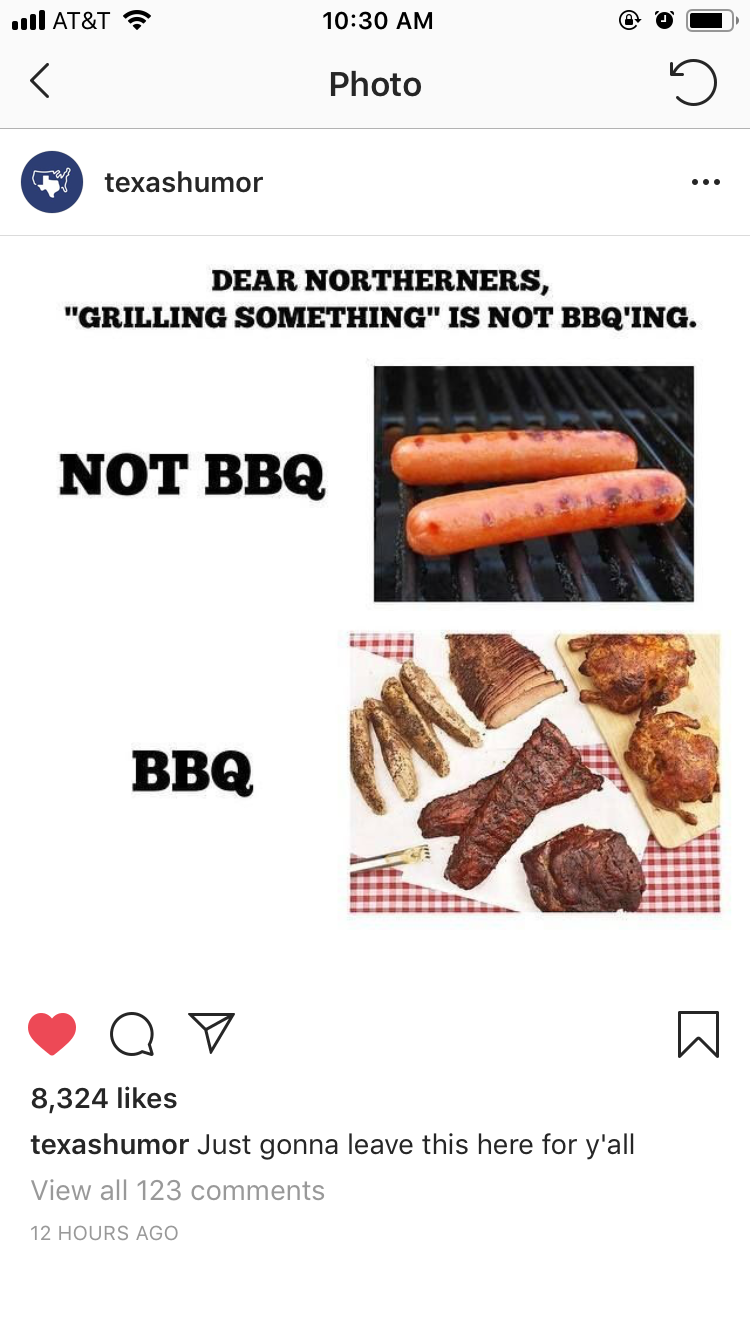Today's newsletter is an ode to BBQ, something I hold very near and dear to my heart. As a strategist, my BBQ journey has been a fascinating one—revealing more to me about a city's culture in one meal than I could learn living there for a year.
BBQ is way more than just a delicious hunk of meat. It has woven its way into the fabric of society; it’s the meat on America’s bones. It’s a badge of honor, a uniter, a religion. It’s diverse, political and celebratory. As the country’s grills are heating up, one might ask, what makes BBQ so special and what does it reveal about America?
A quick side note about my BBQ pedigree, or as I like to call it, my BBQ "complex". I was raised in Dallas by a Texan and Tennessean and married a North Carolinian. So please don’t ask me what my favorite meat, preparation or sauce is because my allegiances would be tested too far.
Before we dive in, we must define what BBQ actually is. It may come as a surprise, but once I moved north of the Mason Dixon line, I realized the definition WIDELY varies. This meme captures my discovery perfectly:
Having lived in Dallas, Austin, NYC, Boston, (sort of in) LA and now Raleigh, my Facebook newsfeed is quite diverse. If you’re looking to spark a debate, just ask people what they call "making burgers and hot dogs on the grill".
In my unofficial survey, those in NYC and LA call it "having a BBQ". Those in Boston sometimes call it a "BBQ" and other times a "cookout". In Texas, it’s called "grilling out" and in NC, it’s a mix of "grilling out" and a "cookout" depending on how many people join. So there you have it, we’re clear as BBQ sauce. Just beware that when you’re invited to a "BBQ" outside of the South, you’re likely not getting...barbecue.
Why do we have so many different terms for our beloved BBQ? According to The Root, in the ’50s, “barbecue grills” were heavily advertised heavily making America conflate grilling with barbecue. No surprise it’s advertising’s fault :)
Ok, so, what is barbecue then really? BBQ is the magical trifecta of combining meat, smoke and sauce and according to Southern Living, it’s all about the “long, low, and slow cooking method."
But it’s not that easy to define—every state and regions within states have a different preference for meat, preparation, sauce and sides. Here is Eater's fabulous regional BBQ guide along with some recos if you find yourself in need of this delectable dish.
Just to get your hunger pains going, this is what I see in my head when I say BBQ—a massive outdoor smoker, red trays with butcher paper, picnic tables, and a beaucoup of BBQ…
What does BBQ reveal about our nation’s DNA? The diversity of BBQ is a perfect mirror of the diversity of America’s settlers (and their taste buds). In a fantastic analysis, Smithsonian Mag traces the development of the BBQ subcultures from one region to the next:
"North Carolina’s vinegar-based sauces are a remnant of the Briton’s penchant for the tart sauce. In South Carolina, a mustard-based sauce was born from French and German immigrants. The trend moved westward, eventually entering Texas where German immigrants had the land to cultivate cattle, and it wasn’t long before Texans were applying Carolina techniques to a different sort of animal entirely. In Memphis, the regionally unique sweet, tomato-based barbecue sauce was born from the city’s port since they could easily obtain molasses. Out of Memphis’ barbecue genes—Kansas City barbecue—was born. A Memphis-born man settled in Kansas City and followed the style of his Memphis roots, using a sweet and spicy barbecue sauce at the restaurant he opened. He did not, however, adhere to the stringent requirements that called for a pork-only barbecue style, and allowed beef and other meats to be sold as well."
So where do the biggest barbecue lovers live? There’s a clear over-index in the South and Texas. (No, Texas in not the South. And we’re proud of that because we can be our own country).
The exciting news is that as of late, the love for BBQ is growing and America's palates are expanding. According to Thrillist, a lifestyle site covering food, drink and entertainment that reaches 20MM unique people on a monthly basis, visitors' time spent with BBQ content increased 50% from 2017 to 2018.
Additionally, they've seen BBQ content that's not explicitly about Southern varieties exploding, increasing from 10% of the top 10 pieces in 2017 to 30% in 2018 and 2019 is already at 40%. This makes sense as international flavors have started to find their way into the BBQ scene.
The amazing thing about BBQ lovers is their true dedication not only to the 'cue but to all things food. According to Eater, a highly-trusted food and restaurant recommendation site that reaches 11MM unique people on a monthly basis, BBQ lovers visit Eater 4x more than the average user and spend 48% more time on the site. Additionally, they are 3.1x more likely to be interested in restaurants than the general Eater audience. Talk about hardcore foodies!
But who REALLY loves BBQ the most? The states in blue searching more for BBQ than beer. North Carolina, you've failed me. Put down the beer and pick up your tongs, ASAP!
What is it about BBQ that makes people compare food to religion?
The dedication (both in time and money) it takes to get the perfect BBQ breeds a passion that runs as deep as our religious roots. And the different BBQ denominations argue just as much about who is right as the church does.
One reader in Texas emphatically describes it this way: "BBQ is a religion with two primary denominations—Pork (east of the Mississippi) and Beef (west of the Mississippi). If you don’t think BBQ is a cooking art form all its own then ask yourself what other style of cooking has hundreds of regional competitions and numerous TV shows documenting these competitions. Great BBQ is the culinary treat of all treats. It combines the art of cooking and the science of baking."
The latest ‘cue-cult call themselves “eggheads” aka Big Green Egg owners. This is a tribe of diehard fans, attending festivals, swapping recipes and becoming lifelong friends (see pics below).
BGEs cost a pretty penny, between $500-$1K+, but they are worth their weight in the BBQ they so perfectly slow roast due to the ancient kamado clay cooking vessels they are modeled after, dating back to the Chinese Qin Dynasty.
And BGE’s success is no joke—they are raking in around $5MM in annual revenue which has also spawned BGE-knockoffs. I guess that’s when you know you’ve made it?
BBQ has landed itself as the unofficially official American cuisine due to its political prowess and power. And it is wielded as a political uniter by the most influential supporters, POTUS.
BBQ is clearly linked to the foundational tentpoles of America. According to the Hearth, Patio and Barbecue Association, the most popular days to grill are July 4th (63%), Memorial Day (60%) and Labor Day (58%). Why is that might you ask?
Robert Moss, author of "Barbecue: The History of an American Institution" describes how BBQ was the perfect rallying food for candidates because it was "the best way to get a bunch of people together to hear your message."
Moss describes that BBQs (where they were cooking barbecue) were "the quintessential form of democratic public celebration, bringing together citizens from all stations to express and reaffirm their shared civic values". They followed a "ritualized format: parade, prayer, reading of the Declaration of Independence, oration, and dinner in a shady grove near a drinking spring, after which dignitaries gave a series of toasts."
Presidents continue to keep this political tradition alive, traveling across the country visiting the state's local, hole-in-the-wall BBQ joint. What better way to win a vote than to win someone's stomach?
What does this all mean? Regardless of how you define BBQ, this food group is a powerful cultural uniter and has been since the beginning of our country. As a strategist, when you're trying to learn about a new culture and group of people, don't forget to look at the food on their plates because it reveals an incredibly interesting and enlightening story.





